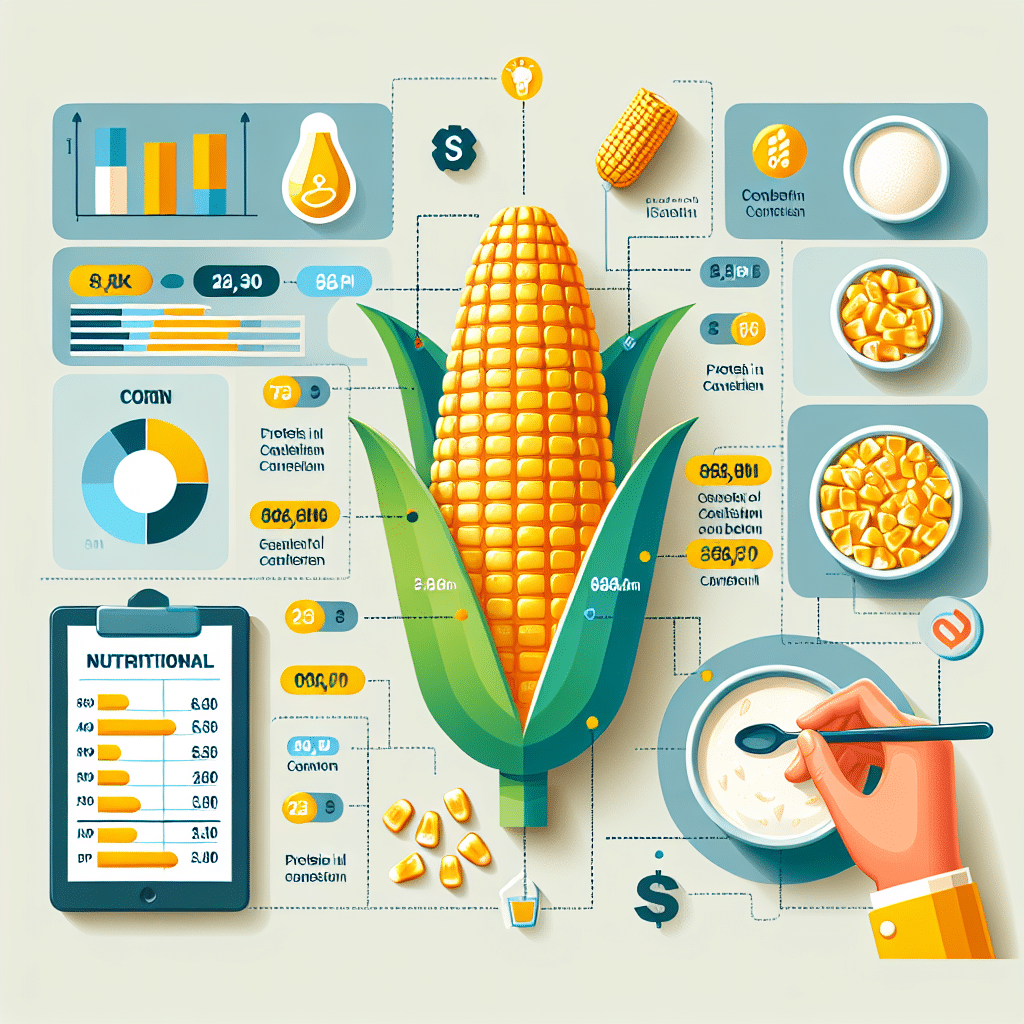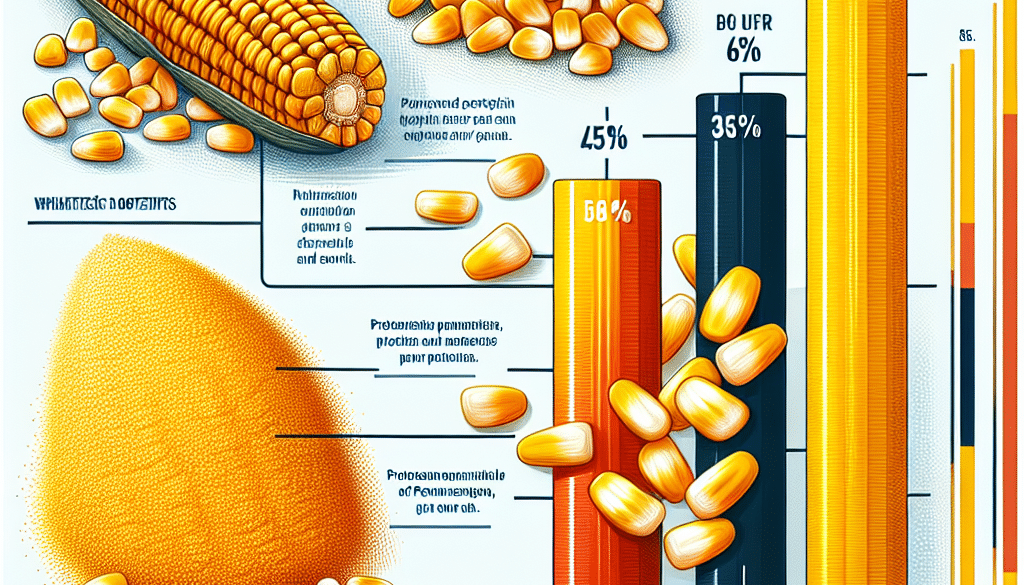Is Corn High In Protein Or Carbs?
-
Table of Contents
- Is Corn High in Protein or Carbs? Understanding Its Nutritional Profile
- The Nutritional Breakdown of Corn
- Comparing Corn to Other Protein Sources
- Carbohydrates in Corn: Energy Source and Dietary Considerations
- Health Benefits and Risks of Corn Consumption
- Integrating Corn into a Balanced Diet
- Conclusion: Corn’s Place in Your Diet
- Discover ETprotein’s High-Quality Protein Products
Is Corn High in Protein or Carbs? Understanding Its Nutritional Profile

Corn, a staple food in many parts of the world, is often a subject of nutritional debate. Is it a good source of protein, or is it primarily a carbohydrate-rich food? This article delves into the nutritional composition of corn and explores its role in a balanced diet. We will examine the protein and carbohydrate content of corn, compare it to other food sources, and discuss its health implications.
The Nutritional Breakdown of Corn
Understanding the nutritional value of corn requires a closer look at its macronutrient composition. Corn is a cereal grain that comes in various forms, including sweet corn, field corn, and popcorn. Each type has a slightly different nutritional profile, but generally, corn is known for its carbohydrate content.
- Carbohydrates: Corn is predominantly composed of carbohydrates. A medium-sized ear of sweet corn (about 90 grams) contains approximately 17 grams of carbohydrates.
- Protein: Corn does contain protein, but it is not as high as its carbohydrate content. The same serving of sweet corn has about 3 grams of protein.
- Fiber: Corn also provides dietary fiber, with a medium-sized ear containing roughly 2 grams.
- Vitamins and Minerals: Corn is a good source of certain vitamins and minerals, including vitamin C, B vitamins, magnesium, and potassium.
It’s clear from this breakdown that corn is higher in carbohydrates than protein. However, the protein it does provide is important to consider in the context of a balanced diet.
Comparing Corn to Other Protein Sources
When evaluating corn as a protein source, it’s helpful to compare it to other common protein-rich foods. For example, a 3-ounce serving of chicken breast contains about 26 grams of protein, while a cup of cooked lentils has about 18 grams of protein. In contrast, a single serving of corn provides significantly less protein.
However, it’s important to note that corn can still contribute to the overall protein intake, especially when combined with other plant-based proteins to create a complete amino acid profile. This is particularly relevant for vegetarians and vegans who rely on a variety of plant foods to meet their protein needs.
Carbohydrates in Corn: Energy Source and Dietary Considerations
As a carbohydrate-rich food, corn serves as an important energy source. The carbohydrates in corn are primarily in the form of starch, which the body breaks down into glucose for energy. Corn also contains natural sugars, particularly in sweet corn varieties, which contribute to its carbohydrate content.
For individuals with diabetes or those watching their carbohydrate intake, it’s essential to consider corn’s glycemic index (GI). The GI measures how quickly a food raises blood sugar levels. Corn has a moderate GI, meaning it can cause a more gradual increase in blood sugar compared to high-GI foods.
Health Benefits and Risks of Corn Consumption
Corn offers several health benefits due to its nutrient content. The fiber in corn can aid digestion and help prevent constipation. Its antioxidants, such as lutein and zeaxanthin, are beneficial for eye health. Moreover, the B vitamins in corn are crucial for energy production and maintaining a healthy nervous system.
However, there are also potential risks associated with excessive corn consumption. High intake of carbohydrates, particularly from processed corn products like high-fructose corn syrup, can contribute to weight gain and metabolic issues. It’s important to consume corn in moderation and as part of a varied diet.
Integrating Corn into a Balanced Diet
Given its carbohydrate content, corn should be balanced with other macronutrients. Here are some tips for incorporating corn into a healthy diet:
- Pair corn with lean proteins such as chicken, fish, or beans to create a more balanced meal.
- Include a variety of vegetables alongside corn to increase the meal’s fiber and nutrient density.
- Opt for whole corn over processed corn products to minimize added sugars and unhealthy fats.
- Be mindful of portion sizes to keep carbohydrate intake in check.
Conclusion: Corn’s Place in Your Diet
In conclusion, corn is higher in carbohydrates than protein, but it can still be part of a protein-rich diet when combined with other foods. Its moderate protein content, along with its fiber and micronutrients, makes it a valuable addition to a balanced diet. However, it’s important to consume corn in moderation and be mindful of its carbohydrate content, especially for those with specific dietary concerns.
Discover ETprotein’s High-Quality Protein Products
If you’re looking to increase your protein intake, consider exploring ETprotein’s range of organic bulk vegan proteins. ETprotein offers a variety of plant-based protein options that can complement your dietary needs, whether you’re looking to boost your protein consumption or seeking alternative protein sources.
About ETprotein:
ETprotein, a reputable protein and L-(+)-Ergothioneine (EGT) Chinese factory manufacturer and supplier, is renowned for producing, stocking, exporting, and delivering the highest quality organic bulk vegan proteins and L-(+)-Ergothioneine. They include Organic rice protein, clear rice protein, pea protein, clear pea protein, watermelon seed protein, pumpkin seed protein, sunflower seed protein, mung bean protein, peanut protein, and L-(+)-Ergothioneine EGT Pharmaceutical grade, L-(+)-Ergothioneine EGT food grade, L-(+)-Ergothioneine EGT cosmetic grade, L-(+)-Ergothioneine EGT reference grade and L-(+)-Ergothioneine EGT standard. Their offerings, characterized by a neutral taste, non-GMO, allergen-free attributes, with L-(+)-Ergothioneine purity over 98%, 99%, cater to a diverse range of industries. They serve nutraceutical, pharmaceutical, cosmeceutical, veterinary, as well as food and beverage finished product distributors, traders, and manufacturers across Europe, USA, Canada, Australia, Thailand, Japan, Korea, Brazil, and Chile, among others.
ETprotein specialization includes exporting and delivering tailor-made protein powder and finished nutritional supplements. Their extensive product range covers sectors like Food and Beverage, Sports Nutrition, Weight Management, Dietary Supplements, Health and Wellness Products, and Infant Formula, ensuring comprehensive solutions to meet all your protein needs.
As a trusted company by leading global food and beverage brands and Fortune 500 companies, ETprotein reinforces China’s reputation in the global arena. For more information or to sample their products, please contact them and email sales(at)ETprotein.com today.














